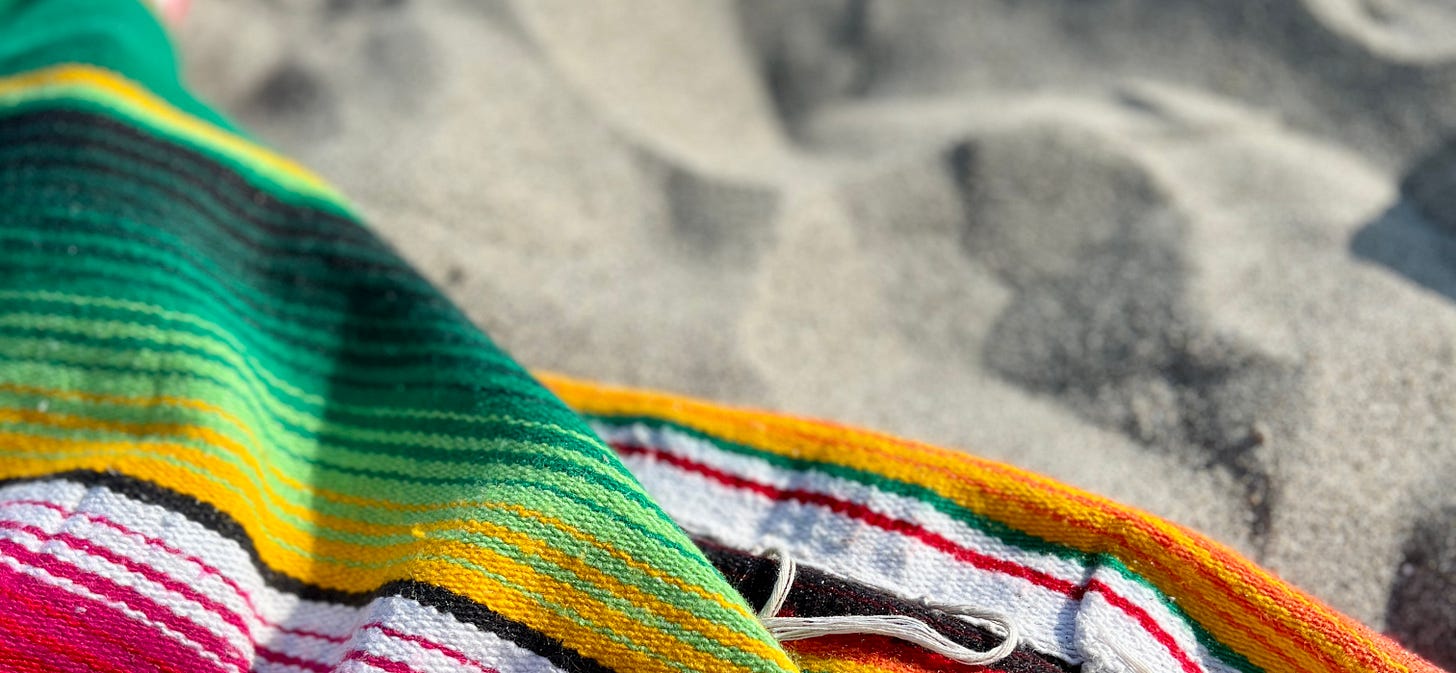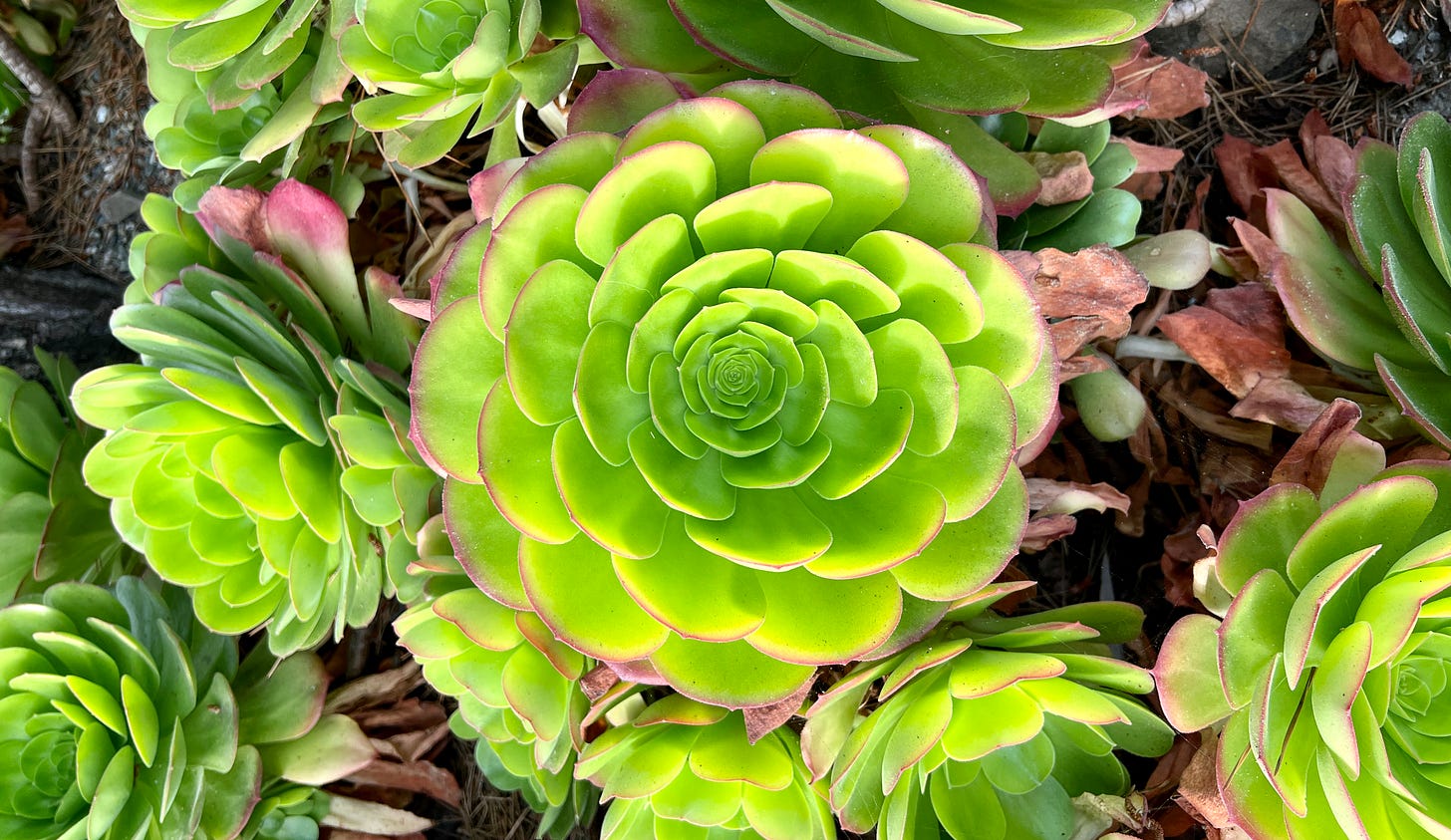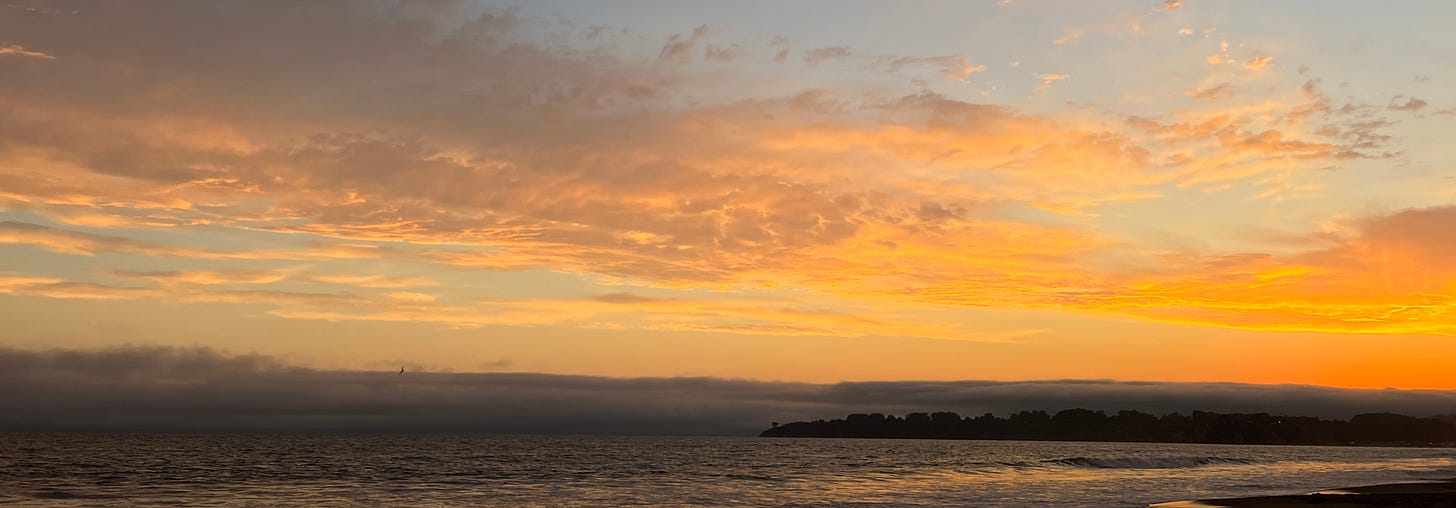TGIF :: An Ode To Deep Rest
Weekly drop #20 || Honoring an unexpected core need, WITHOUT permission slips.
“Every person needs to take one day away. A day in which one consciously separates the past from the future. Jobs, family, employers, and friends can exist one day without any one of us, and if our egos permit us to confess, they could exist eternally in our absence. Each person deserves a day away in which no problems are confronted, no solutions searched for. Each of us needs to withdraw from the cares which will not withdraw from us.” —Maya Angelou, Wouldn't Take Nothing for My Journey Now
Just Being
On the third day of our week by the sea, I followed my twelve-year-old son and his buddy to the beach next to our simple vacation rental. The fog was lifting and the sand was hot under our feet, prompting the kids to drop their towels and sprint towards the waves, screaming with joy. I set their sandals beside my blanket, and fell into an easeful seated position, not taking my eyes off of the silhouettes of their little bodies against the blindingly bright horizon.
Around me, families, groups of friends, and couples seemed so prepared with umbrellas, coolers, folding chairs, music, games, kites, towels. How did they get all of this stuff out here? I was momentarily proud of my minimalism but soon found myself coveting a neighbor’s shade structure. I dated someone who always had all of the gear, everywhere we went. It was nice sometimes, but don’t miss the weight of it all.
The breeze penetrated my yellow hoodie, worn over a swimsuit, jeans, and a ball cap—somehow keeping me a perfect temperature—cool and protected in the direct sunshine, yet still warm. I studied the movement of the sand, seemingly alive. Clumps from footprints crumbled into softer terrains as the sun baked out the moisture.
The kids, screaming with delight now, darted among the waves. Body surfing from waist height to the shore, they'd rush back out, in a continuous loop: ride in, run out. Their voices muffled in the roar of the waves, I imagined their exchanges: “See that big one?” “Watch this!” “Bet you can't do this!”
A seagull landed nearby, gave me a side-eye, realized I had no food, and launched off the beach again. I felt the wind of its wing on my hand, holding a knee to my chest. Curls tickled my cheeks. I typically care about keeping my hair tidy, shiny, and somewhat straight, but not now. Today is a day of rest and ease. I haven’t even showered since my morning run. I’ll swim in the ocean first. I considered napping or meditating, but either of those would mean closing my eyes, and I wanted to watch the kids. So I sat there and let it all in. For over an hour. Just, being.
Achieving Nothing, Sort-of
By Monday I realized I’d done a lot of that over the weekend, a lot of not that much. Yes, I read most of two books, played with the kids, helped conquer a 500-piece puzzle, and enjoyed some simple cooking, but I also allowed space to simply be. The inner drumbeat was slowing. Oh, this is real rest, I thought to myself.
Sitting with my morning coffee I crafted an Instagram post about following a wise teacher-friend’s advice to do one less project between now and the end of the year—a personal triumph of sorts (the non-doing). I reflected on spaciousness, pattern breaking, intentional bouts of inactivity, long sleeps, and helping others a little less than usual. I’m a go-go kinda girl, so resting without feeling guilty feels a bit… like an accomplishment. So I posted something clever on it.
Am I missing the point?
Deep Rest
Very smart researchers have concluded that there are seven kinds of rest: physical, mental, spiritual, emotional, sensory, social, and creative. Thanks to TED, you can read (or watch a video) about this here (Dr. Saundra Dalton-Smith MD does know her stuff).
The scheme makes sense. We get tired in different ways, so we should rest what needs resting—our bodies after physical exertion, our minds after extended intense thought, our hearts after emotional turbulence, and so on.
Then I read this:
There are two types of tired: one that requires rest and one that requires peace.
When I think of what “deep rest” means to me, it doesn’t fit neatly in any of the researcher’s seven categories. It feels broader, deeper, more like a need for peace. The kind of peace that allows for generous solitude, unscheduled hours, the sensation of being in the midst of time with no linear direction, and the opportunity to just allow what happens next. Deep rest allows for intuitive whispers, the ability to feel and hear the body’s wise signals, and know—truly know—what to do at life’s crossroads.
Where do we find deep rest in our hectic lives? The elderly often embrace or endure it, while children remain blissfully unaware. But many of us, in young adulthood or mid-life, driven by societal and personal pressures, press forward—sometimes painfully so. We push until stopped by a family crisis, a major health hurdle, or some other “speed bump” that slows us down—worse, stops us in our tracks.
Permission Slips
Many of us feel we don’t “deserve” deep rest, letting guilt and “shoulds” invade our thoughts when we get close. It’s as if something inside makes us feel like we need permission from someone else to take a break. Yet deep rest is an essential pause for our nervous systems to recalibrate, our senses to re-tune, our softer sides to feel safe enough to reveal themselves again.
Earlier this year I had the privilege of driving Gabor Maté and his wife Rae to and from the airport when they came to town to speak at Wisdom 2.0. Catching up on the way, I shared a silver lining of my recent breast cancer experience:
“It felt like a permission slip to follow through with an intention to take the year of 2023 off, the first break from an intense start-up tech executive career since 2001. I wanted the spaciousness to take care of myself, expand my ClearLife offerings, and make good decisions about what’s next in life. I’d felt a bit meek, apologetic about the choice until a medical diagnosis practically made it non-negotiable.”
“Interesting you felt you needed permission, Cecily,” Gabor commented.
Then this week I was catching up with a dear friend who’s also recently navigated cancer. She shared that her family had been encouraging her to take a significant trip in a few months, but she didn’t feel quite ready for the planned scale of physical effort and activity. After noodling on it for a while, she asked her doctor for his opinion. He confirmed her intuition: It’s too early in her recovery to participate in this kind of physical adventure. Her reaction was relief—he’d given her permission to listen to herself.
Permission, by definition, implies external consent. Why are we letting others decide or confirm what we need, especially when we are talking about our wellbeing? Does this disproportionately impact women? It appears so. Anecdotally, I see more women cracking under pressure to persevere than men. More women being stopped in their hectic tracks by illness. More women relying on external validation, approval, permission to listen to themselves and pause.
Do you see this too?
So What Does Deep Rest Have to Do With Exploring ClearLife?
In addition to being part of healthful living, deep rest (1) supports conditions for true authenticity, (2) helps us restore equilibrium after extended bouts of flight-or-flight mode (which could be daily), and (3) allows more easeful decision making.
1. The Authentic You
Many of us resort to dimming habits to “get through” tough stuff, override our intuition, or “take the edge off” some form of discomfort. When we pause a dimmer—take a break from drinking/smoking/scrolling, whatever it is—it’s very common to replace it with another distraction, further evading our true selves.
If we are truly in pursuit of a life of more presence, replacing one dimmer with another—even if “healthier,” defeats the point. A sober workaholic isn’t necessarily better off than a stoned dropout. Deep rest helps us access our truest selves, protecting us from jumping from one dimmer to another.
2. Healing After Fight or Flight
Even after years on some version of a ClearLife journey, we might find ourselves restless and perpetually on edge. This is especially common in codependency scenarios, when we’ve cared for someone in distress of some kind. Deep rest helps us recognize these patterns and restore equilibrium we may need or want for a more calm and present life experience.
3. A Tuned Inner Compass; No More Permission Slips
Pausing a dimmer is one thing. Listening to ourselves is yet another. Sensing what we need or want in order to take care of ourselves or our loved ones—and acting on it without apology, external validation, or vacillation—is yet another stepping stone on the journey. I’m still working on this myself :)
Practices in Pursuit of Deep Rest
Define it regularly. What does deep rest look like for you right now? Is it non-doing? Is it (literal) quiet time? Consider reviewing the seven types of rest (another article here) to see if one feels particularly resonant for you. Terrified of exercising without something in your ears? Afraid to discover how much sleep you naturally need without an alarm clock? Often what we need is what we resist the most. Take the time to pause and assess what is needed in the moment.
Prioritize it. Commit to prioritizing regular pockets of deep rest. This can be as little as ten scheduled minutes to recline, in silence, with no distractions, paying very close attention to all of the senses. It might also mean a meaningful amount of time away from daily routines and the people we love but sometimes need a little space from, when feasible. We all have different needs that shift over time.
Radical listening. If deep rest is terribly difficult, maybe approach the effort differently: backwards. Something inside telling you that you need a day off but not sure what for? Figure out a way to honor that. A voice inside telling you to resign from a duty to have more time for other things? Pay attention. Often our intuitive guidance is actually steering us towards the rest we need.
Be a role model. If it’s still hard to do something for yourself, consider the benefit to others in setting an example. For example, leaders can be explicit about the need for a day of rest without an appointment, crisis, or family need to attend to. Parents can tell their families they are taking some time to themselves and appreciate others picking up the care duties until they’re refreshed and restored. The ripple effect of these actions likely extends far beyond the moment.
Re-Entry
Later this morning, shortly after publishing this article, we’ll pack up and leave this beachside haven and return to “real life.” There is work to do, a new school year to start, errands and chores to tend to, medical and dental appointments to make, and sports seasons to kick off. It’s not lost on me what a luxury this has been. I’ve worked hard to afford these indulgences, making them even more precious. ( ← See? I’m still doing it myself—feeling a need to “justify” this time.)
When we planned this week at the beach months ago, I knew we’d have fun—and we certainly did—especially the days and nights when there were piles of kids’ sneakers at the door and screaming at the poker table. But I didn’t expect to discover this treasure of deep rest. It’s like I found a vein of precious gold in the craggy mountain range of life. With an eye and sense for it now, I look forward to weaving it into our daily lives a bit more.
May you too find what you need. ❤️
Miscellaneous…
The Eight Awarenesses… For the last two weeks I’ve noted that I’ll send my Eight Awarenesses “round up” next week. I take commitments very seriously, but I’m learning to be less rigid and more connected with what is most alive for me in each moment. So, that post will come when I’m ready to publish it, probably on a Friday after a week when I wasn’t moved by another theme—like pole dancing or deep rest.
ClearLife Offerings: I’m collecting interest in upcoming ClearLife offerings via this simple form if you’re inclined to join us.
Thank you… for your questions, comments, likes—and subscriptions! They help my ClearLife work reach the people it is intended to reach.








Loved this. On the beach with you...